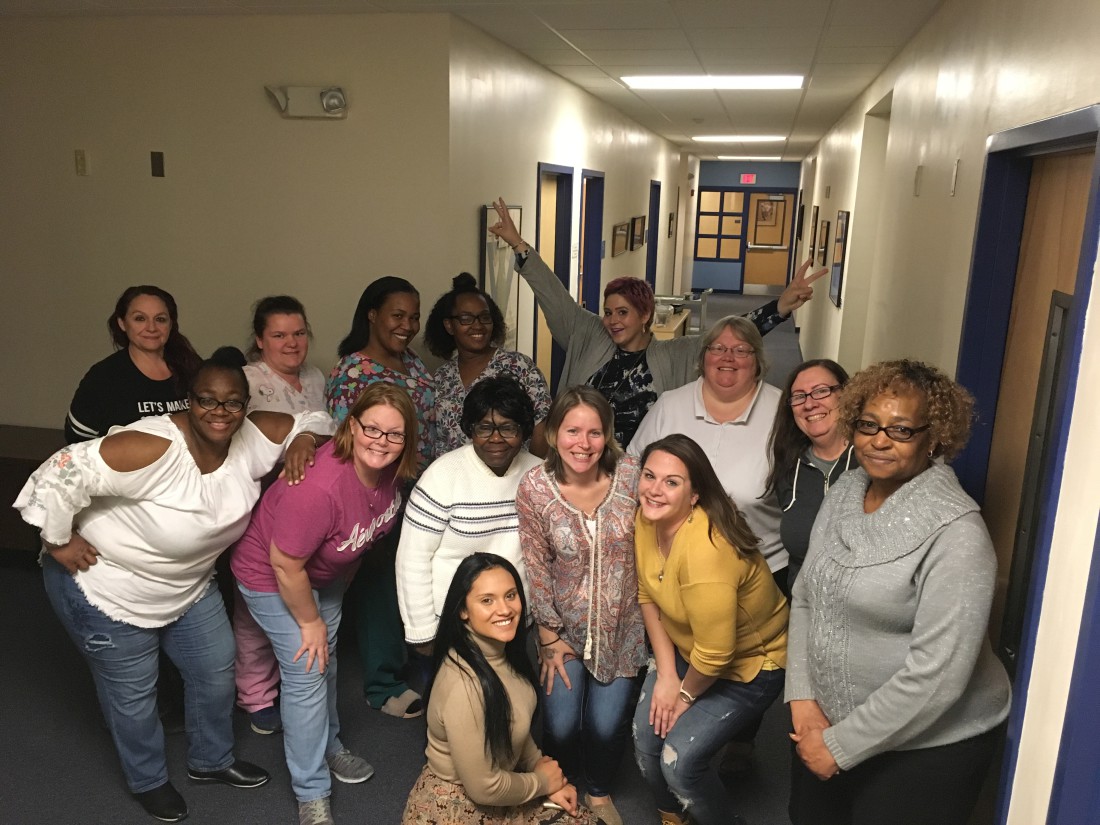Each year, like competitors on “Shark Tank,” representatives of dozens of local nonprofits pack the Buncombe County Board of Commissioners chambers to deliver a pitch.
Standing at a podium facing the dais, representatives have three minutes to make their case to commissioners. After two minutes, a light on the podium turns yellow. Sixty seconds later, a red light accompanied by a high-pitched beep tells presenters their time is up.
“Some people are really, really prepared for the presentation,” says Dawn Chavez, the executive director of Asheville GreenWorks, a local nonprofit with a focus on the environment, “but other people just kind of ramble for three minutes.”
Members of the Buncombe County Board of Commissioners and Asheville City Council hear funding requests from a series of nonprofit organizations as part of their annual budget deliberations. Both governments allot discretionary money for strategic partnership funds, grants that target issues elected officials have identified as priorities.
Last year, Asheville distributed $158,400 to 15 nonprofits, and Buncombe County distributed almost $1.3 million to about 30 nonprofits. Those amounts are relatively small drops in the city’s and county’s yearly budget buckets. Last year, the city had an operating budget of $175.4 million, and the county had an operating budget of $433.2 million.
During the presentations to the Board of Commissioners, completed applications, along with a staff analysis, sit on the dais in front of each board member. “Staff does not provide recommendations or scoring or anything like that,” said Rachael Nygaard, the director of strategic partnerships for Buncombe County, “just analysis and compilation of information to help [commissioners] to make those funding decisions.”
The city and county don’t just shoot from the hip when awarding program funding. City Council members evaluate a funding request’s alignment with the city’s 2036 Vision, which details what Asheville will look like in the future. To provide guidance for their decisions, county commissioners look to county strategic priorities as well the county’s sustainability plan.
Helping hands
African-American children are six times more likely to drown than white children, says YWCA Executive Director Beth Maczka. That’s something the organization is trying to solve with its Swim Equity program, which offers free swimming lessons to students from low-income backgrounds.

“It’s just one of those disparities that we think we can eliminate,” Maczka said. During the fiscal year that ends on June 30, the county has supported the program to the tune of $20,400 in strategic partnership funding.
For the upcoming year, the YWCA is seeking $20,000 from both the county and the city to continue and potentially expand the Swim Equity program. The organization also hopes to secure city and county funding for a program it’s currently offering: a 16-session series of classes called Getting Ahead in a Just Gettin’ By World, which aims to empower low-income women who live at or below 200 percent of the poverty level.
The dollar amount that individual nonprofits request varies a great deal. The county gets requests for as little as several thousand dollars or as much as $150,000. The city sees a similarly wide range on a smaller scale. “We’ve managed grants as low as $1,500 to as high as $30,000 to $35,000 out of that funding stream, so there’s not really a typical amount,” says Heather Dillashaw, community development director with the city of Asheville.
Welcome endorsement
The grants also mean different things to different organizations. For relatively large nonprofits like the YWCA, county and city grant funding makes up a relatively small percentage of the organizations’ total yearly budget. Still, a show of support by a governmental institution can be helpful when seeking funding from other sources. “It’s kind of a stamp of approval to have support from the county,” Maczka says.
Dillashaw says funding from the city and the county probably makes up a relatively small percentage of the yearly budget for most nonprofits, but she seconds Maczka’s notion that it does look good to have that support.
“If a public entity like a city, county or a municipality stands behind an organization and the work they’re doing, that tends to mean something to other funders as well,” she says.
Put through their paces
Chavez says the funding process, especially with the city, can be a bit cumbersome. For one thing, describing the grants as a “partnership” is a misnomer, she says. “It’s more of a grantor-grantee relationship. For these small sums of money, these small nonprofits have to jump through some pretty big hoops, and there’s high expectations around collaboration and partnering with each other that just aren’t realistic.”
Receiving a grant from the county or the city comes with the expectation that the nonprofit will provide regular updates detailing progress toward performance goals set by the elected officials as part of the agreement to provide support. For its $20,400 grant award from the county for the Swim Equity program, for example, the YWCA tracks both the number of students participating in lessons and, of those, how many reach an adequate level of swimming competency.
Dillashaw says the city has a similar system, which requires that organizations report progress toward anticipated outcomes whenever they submit a request for funds from their grant. YWCA, for example, received $12,000 for its Getting Ahead program from the city for the current year. As part of that agreement, the YWCA is expected to ensure that 80 percent of participants report an increased understanding of the causes of poverty, among other outcomes.
For Chavez, the reporting requirements that come along with city grants aren’t in proportion to the amount of money that’s awarded.
“If you get a $5,000 grant for a youth program, let’s say, that hardly makes a dent in what you could provide, yet you have to report on all the same amount of things as if you got a $150,000 grant,” Chavez says.
But Dillashaw says there’s only so much the city can do to streamline the process.
“We have to have documentation to write a check,” she says. “It has to align with the outcomes that they’ve said they would do. We have to have proof that they’re doing that. I mean, that’s all public process stuff.”
Finding a way
Asheville GreenWorks has applied for strategic partnership funding in the past but now has a contract with the city, which offers a much more reliable funding stream. “That’s never guaranteed,” Chavez says, “but it has allowed us to strengthen our partnership with different departments in the city rather than having to go through a whole competitive application process every year.”

Another nonprofit organization that’s entered into a longer-term arrangement with the city is the Asheville City Schools Foundation, which receives city funding in support of its In Real Life after-school program at Asheville Middle School and Montford North Star Academy.
Yearly funding decisions, on the other hand, proceed in two phases: The Housing and Community Development Committee, which is composed of three members of Asheville City Council, hears funding requests from organizations, then sends its recommendations to the full Council, which has final say.
The requests that members of the committee hear from nonprofits are similar to the presentations delivered before the county Board of Commissioners. And like the presentations in front of the county commissioners, the city approval process can be nerve-wracking. There’s only so much money to go around.
“I can’t really overstress this,” Dillashaw says, “and I’m sure the county would say the same: We have all these priorities that City Council wants community partners to meet, but there’s not enough money to fully fund all the requests. And so that’s really challenging for folks.”
Chavez says Council members have been upfront about this in the past, recalling one meeting where Council members told nonprofit representatives that some of them would be going home empty-handed. Ideally, Chavez would like to see more people with nonprofit experience involved in the decision-making process.
“I don’t want that funding to go away for anyone,” she said, “but I just think that it needs to be retooled.”
While the available funding always falls short of meeting every organization’s needs, the city nonetheless is seeing more applications now than it used to, Dillashaw says. There’s also been an effort to ease the process for organizations that apply for funding from both the city and the county, which tends to be pretty common. This year, the city and county used the same application and offered a joint workshop for nonprofits applying for grant funding. “They’re really trying to totally take away the burden of all that,” Maczka said.
Special programs
The city and county also offer alternative grant programs. The county recently created the Isaac Coleman Economic Community Investment grant program, which aims to narrow the gap in economic opportunities for white and black residents through targeted investment. In 2017 — its first year — the grant awarded a total of $635,426 to seven grassroots organizations.
The program hit a bump in the road early on, after one recipient, United Community Development, switched its planned job-training program from masonry to green infrastructure. An Oct. 9 letter from the county instructed the organization to freeze spending on certain categories of expenses to allow for county input. The program got back on track and set up a weatherization job-training program, according to Nygaard. No other Isaac Coleman grant recipients have been the subject of corrective action by the county, she says.
The county also offers smaller allotments of up to $5,000 through Tipping Point Grants, which are awarded to community members in an effort to catalyze work they’re already doing in the community. Asheville awards federal dollars to nonprofits through the Community Development Block Grant program, a program that Dillashaw says tends to have different — and more stringent — criteria than strategic partnership grants.
Even though some nonprofit leaders might find the process tedious, the grant funding offered by the city and county is simply one patch in the quilt of funding that most nonprofits must stitch together every year to perform work in the community.
“There tends to never be enough to go around to meet some of these disparity gaps in the community,” Dillashaw says, “and so I think most nonprofits tend to try to get as much support as they can.”




Before you comment
The comments section is here to provide a platform for civil dialogue on the issues we face together as a local community. Xpress is committed to offering this platform for all voices, but when the tone of the discussion gets nasty or strays off topic, we believe many people choose not to participate. Xpress editors are determined to moderate comments to ensure a constructive interchange is maintained. All comments judged not to be in keeping with the spirit of civil discourse will be removed and repeat violators will be banned. See here for our terms of service. Thank you for being part of this effort to promote respectful discussion.